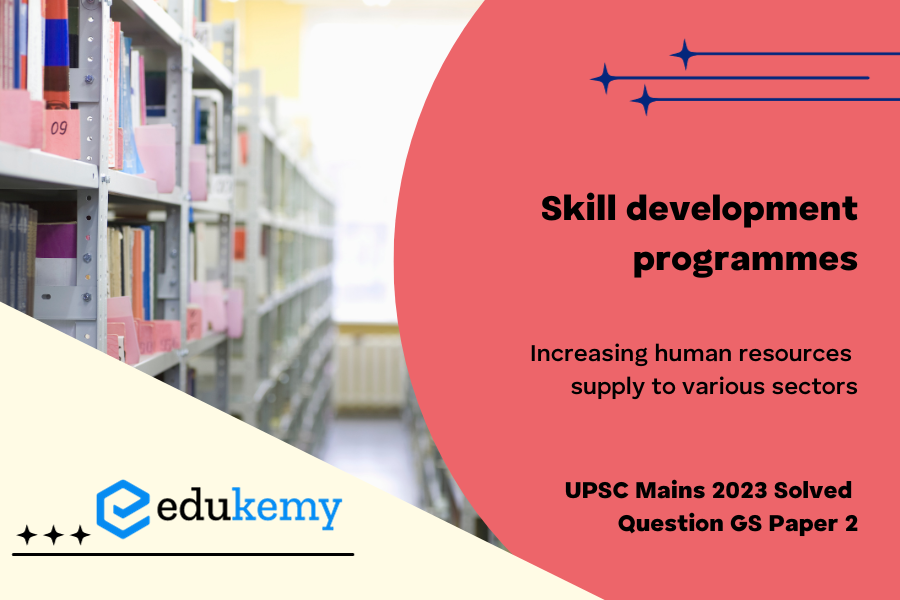The Mains 2023 GS Paper 2 featured a question exploring the impact of skill development programs on the supply of human resources across different sectors. The question prompted an analysis of the interconnections between education, skill enhancement, and employment. Subsequently, the model answer to this question is worth examining.
UPSC Mains General Studies Paper – 1 Mains 2023
UPSC Mains Civil Services IAS Exam Question Paper – 2023
Contents
Introduction
With around 70% of the population in the working age cohort, India is impregnated with Human resources. The catch lies in skilling this populace and reaping the benefits as demographic dividends while the demographic window exists.
Body
Skill development, education and employment are the 3 facets of human resource’. The linkages between the same are as-
1. Education as a Foundation:
- Education in India, including primary and secondary education, imparts fundamental knowledge and cognitive skills.
- It lays the groundwork for more specialised education or vocational training, preparing individuals for various career paths.
- For example, the Indian Institutes of Technology (IITs) provide high-quality engineering education as a foundation for advanced technical skills.
2. Skill Development as a Complement:
- Skill development programs complement formal education in India by equipping individuals with practical, industry-specific competencies.
- These programs bridge the gap between theoretical knowledge and practical application, enhancing job readiness.
- The National Skill Development Corporation (NSDC) and its affiliated training centres offer skill development programs across various sectors like craftsmanship (goldsmithing, iron smithing, carpentry, etc.), traditional arts, etc.
- For example, PMKVY offers courses in various sectors, including healthcare, IT, and retail, aligning with industry needs.
3. Enhancing Employability:
- Education and skill development together enhance employability by providing a broad understanding and specific skills relevant to job roles.
- Employers in India seek candidates who possess a combination of formal education and applicable skills.
- For example, a graduate with a degree from IITs and IIMs can increase employability by acquiring project management skills.
4. Adaptation to Market Needs:
- Professionals in the IT industry sector undergo regular skill development training to stay current with the latest technologies, ensuring their long-term employability.
- professionals to continuously upskill to adapt to evolving medical practices and technologies. Continuous medical education programs are prevalent, ensuring healthcare workers remain updated.
- For example, the ‘Digital India’ initiative emphasises digital literacy, addressing the evolving demands of the technology sector.
5. Economic Growth and Innovation:
- A well-educated and skilled workforce is crucial for India’s economic growth and innovation.
- India’s vocational education and apprenticeship programs contribute to reducing youth unemployment rates and fostering competitiveness.
- Example: Initiatives like ‘Make in India’ and ‘Startup India’ underline the importance of skill development and entrepreneurship in fostering economic growth and technological innovation.
6. Lifelong Learning:
- The modern job market in India requires individuals to engage in lifelong learning.
- Professionals continuously update their skills through courses, workshops, and on-the-job training to stay relevant.
- Embracing new technologies and adapting to industry changes is essential for career longevity.
- Example: Platforms like the National Programme on Technology Enhanced Learning (NPTEL) facilitate ongoing skill development, keeping the workforce competitive and innovative.
| Case study- A pilot project, “Village Engineers Project”, for the multi-skilling of tribal youth by NSDC in Bhopal. MoTAs Special Central Assistance to Tribal Sub-Scheme’ for Vocational training in Tribal Areas for upgrading the skills of the tribal youth. |
Conclusion
Hence, The linkages between education, skill development, and employment are integral to the growth and development of human resources and the economy. In a rapidly changing job market, the commitment to lifelong learning is essential to staying relevant and competitive. Recognizing and investing in these linkages is vital for addressing the challenges and opportunities presented by a dynamic job market and is key to achieving sustainable economic development.
In case you still have your doubts, contact us on 8792740517.
For UPSC Prelims Resources, Click here
For Daily Updates and Study Material:
Join our Telegram Channel – Edukemy for IAS
- 1. Learn through Videos – here
- 2. Be Exam Ready by Practicing Daily MCQs – here
- 3. Daily Newsletter – Get all your Current Affairs Covered – here
- 4. Mains Answer Writing Practice – here


